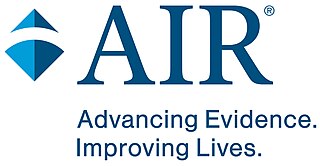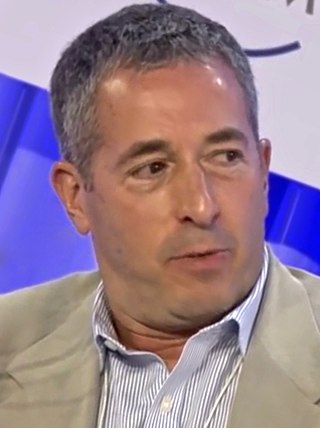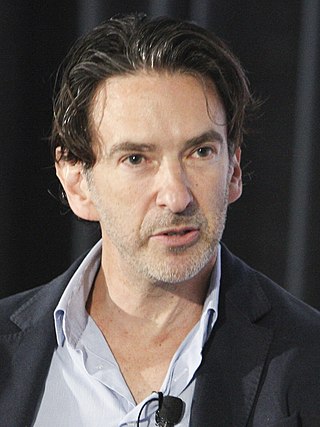
Carl Ransom Rogers was an American psychologist who was one of the founders of humanistic psychology and was known especially for his person-centered psychotherapy. Rogers is widely considered one of the founding fathers of psychotherapy research and was honored for his pioneering research with the Award for Distinguished Scientific Contributions by the American Psychological Association (APA) in 1956.
School psychology is a field that applies principles from educational psychology, developmental psychology, clinical psychology, community psychology, and behavior analysis to meet the learning and behavioral health needs of children and adolescents. It is an area of applied psychology practiced by a school psychologist. They often collaborate with educators, families, school leaders, community members, and other professionals to create safe and supportive school environments.
Absenteeism is a habitual pattern of absence from a duty or obligation without good reason. Generally, absenteeism refers to unplanned absences. Absenteeism has been viewed as an indicator of poor individual performance, as well as a breach of an implicit contract between employee and employer. It is seen as a management problem, and framed in economic or quasi-economic terms. More recent scholarship seeks to understand absenteeism as an indicator of psychological, medical, or social adjustment to work.
Applied behavior analysis (ABA) is a scientific discipline that utilizes the principles of learning based upon respondent and operant conditioning to make socially significant changes in a subject's behavior. ABA is the applied form of behavior analysis. The impact ABA has on meaningful behaviors is a defining feature, and what differentiates it from experimental analysis of behavior, which focuses on basic experimental research.
The Association for Behavior Analysis International (ABAI) is a nonprofit organization dedicated to promoting behavior analysis. The organization has over 9,000 members. The group organizes conferences and publishes journals on the topic of applied behavior analysis (ABA). ABAI has issued detailed, specific position papers intended to guide practitioners of ABA. The ABAI publishes six scholarly journals including The Psychological Record and their primary organ, Perspectives on Behavior Science, formerly The Behavior Analyst. They also publish an informational journal, Education and Treatment of Children, describing practical treatment of children with behavioral problems.

The University of Chicago Harris School of Public Policy is the public policy school of the University of Chicago in Chicago, Illinois, United States. It is located on the University of Chicago's main campus in Hyde Park. The school's namesake is businessman Irving B. Harris, who made a donation that established the Harris School in 1986. In addition to policy studies and policy analysis, the school requires its students to pursue training in economics and statistics through preliminary examinations and course requirements. The Harris School offers joint degrees with the Booth School of Business, Law School, School of Social Service Administration, and the Graduate Division of the Social Sciences.
Floyd Henry Allport was an American psychologist who is often considered "the father of experimental social psychology", having played a key role in the creation of social psychology as a legitimate field of behavioral science. His book Social Psychology (1924) impacted all future writings in the field. He was particularly interested in public opinion, attitudes, morale, rumors, and behavior. He focused on exploration of these topics through laboratory experimentation and survey research.

Jennifer A. Richeson is an American social psychologist who studies racial identity and interracial interactions. She is currently the Philip R. Allen Professor of Psychology at Yale University where she heads the Social Perception and Communication Lab. Prior to her appointment to the Yale faculty, Richeson was Professor of Psychology and African-American studies at Northwestern University. In 2015, she was elected to the United States National Academy of Sciences. Richeson was elected to the American Philosophical Society in 2022. Since 2021, she has been a member of the President’s Council of Advisors on Science and Technology (PCAST).

Robert Epstein is an American psychologist, professor, author, and journalist. He was awarded a Ph.D. in psychology by Harvard University in 1981, was editor-in-chief of Psychology Today, and has held positions at several universities including Boston University, University of California, San Diego, and Harvard University. He is also the founder and director emeritus of the Cambridge Center for Behavioral Studies in Concord, MA. In 2012, he founded the American Institute for Behavioral Research and Technology (AIBRT), a nonprofit organization that conducts research to promote the well-being and functioning of people worldwide.
Michael Lamport Commons is a theoretical behavioral scientist and a complex systems scientist. He developed the model of hierarchical complexity.
The School of Communication and Information (SC&I) is a professional school within the New Brunswick Campus of Rutgers, The State University of New Jersey. The school was created in 1982 as a result of a merger between the Graduate School of Library and Information Studies, the School of Communication Studies, and the Livingston Department of Urban Journalism. The school has about 2,500 students at the undergraduate, masters, and doctoral levels, and about 60 full-time faculty.

Armin Falk is a German economist. He has held a chair at the University of Bonn since 2003.

The American Institutes for Research (AIR) is a nonprofit, nonpartisan behavioral and social science research, evaluation, and technical assistance organization based in Arlington, Virginia. One of the world's largest social science research organizations, AIR has more than 1,800 staff in locations across the United States and abroad.

Eldar Shafir is an American behavioral scientist, and the co-author of Scarcity: Why Having Too Little Means So Much. He is the Class of 1987 Professor in Behavioral Science and Public Policy; Professor of Psychology and Public Affairs at Princeton University Department of Psychology and the Princeton School of Public and International Affairs, and Inaugural Director of Princeton’s Kahneman-Treisman Center for Behavioral Science and Public Policy.
Michael Avram Podhorzer is an American political strategist. He was the political director of the AFL–CIO, before becoming a senior adviser to its President Richard Trumka.
The Behavioural Insights Team (BIT), also known unofficially as the "Nudge Unit", is a UK-based global social purpose organisation that generates and applies behavioural insights to inform policy and improve public services, following nudge theory. Using social engineering, as well as techniques in psychology, behavioral economics, and marketing, the purpose of the organisation is to influence public thinking and decision making in order to improve compliance with government policy and thereby decrease social and government costs related to inaction and poor compliance with policy and regulation. The Behavioural Insights Team has been headed by British psychologist David Halpern since its formation.
Founded in 1936, the Society for the Psychological Study of Social Issues (SPSSI) is a group of 3,000 scientists from psychology and related fields who share a common interest in research on the psychological aspects of important social and policy issues. In various ways, SPSSI seeks to bring theory and practice into focus on human problems of the group, the community, and nations, as well as on the increasingly important problems that have no national boundaries. SPSSI affords social and behavioral scientists opportunities to apply their knowledge and insights to the critical problems of today's world. SPSSI fosters and funds research on social issues through annual awards and programs of small research grants and disseminates research findings through its scholarly journals, sponsored books, specialized conferences, and its convention programs. SPSSI encourages public education and social activism on social issues and facilitates information exchange through its newsletter, social media, and electronic discussion groups. With headquarters in Washington, DC, the Society influences public policy through its publications, congressional briefings, and the advocacy efforts of its members, fellows, and staff. The Society's mission is extended to the global arena by a team of representatives who cover developments at UN headquarters in New York and Geneva. SPSSI has been represented at the United Nations as a Non-Governmental Organization (NGO) since 1987. SPSSI serves as consultant to the UN Economic and Social Council (ECOSOC). An independent society, SPSSI is also Division 9 of the American Psychological Association (APA) and an organizational affiliate of the American Psychological Society (APS).

Geoffrey L. Cohen is the James G. March Professor of Organizational Studies in Education and Business, professor of psychology and, by courtesy, at the Graduate School of Business at Stanford University. He is also a faculty affiliate of the Stanford Institute for Human-Centered Artificial Intelligence.

Jessica Schleider is an American psychologist, author, and an associate professor of Medical Social Sciences at Northwestern University. She is the lab director of the Lab for Scalable Mental Health.








